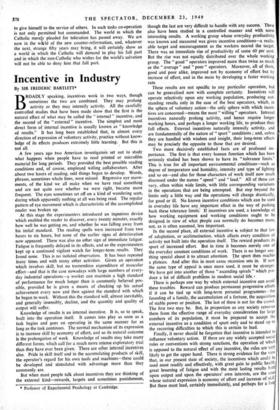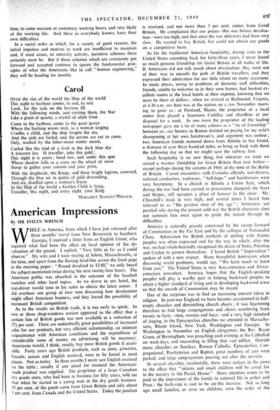Incentive in Industry
By SIR FREDERIC BARTLETT*
BROADLY speaking, incentives work in two ways, though sometimes the two are combined. They may prolong activity or they may intensify activity. All the carefully controlled studies that have been made show that the first is the natural effect of what may be called the " internal " incentive, and
the second of the " external " incentive. The simplest and most direct form of internal incentive is usually known as " knowledge of results." It has long been established that, in almost every direction of expression of voluntary activity, practice without know. ledge of its effects produces extremely little learning. But this is not all.
A few years ago two American investigators set out to study what happens when people have to read printed or microfilm material for long periods. They provided the best possible reading conditions and, of course, employed willing collaborators. After about two hours of reading, odd things began to develop. Words,
phrases, sometimes whole lines, were missed. Regressive eye move-
ments, of the kind we all make when we have read something and are not quite sure whether we were right, became more frequent. The eyes sometimes set off on a kind of wandering scan, during which apparently nothing at all was being read. The regular pattern of eye movement which is characteristic of the accomplished reader was broken up.
At this stage the experimenters introduced an ingenious device which enabled the reader to discover, every twenty minutes, exactly how well he was getting on, and whether he was falling away from his initial standard. The reading spells were increased from two hours to six hours, but none of the earlier signs of deterioration now appeared. There was also no other sign of immediate fatigue.
Fatigue is frequently delayed in its effects, and so the experimenters kept up a continued vigilant watch for longer-term results. They found none. This is no isolated observation. It has been repeated Many times and with many other activities. Given an operation which involves skill, but no tremendous expenditure of muscular effort—and that is the case nowadays with large numbers of every- day industrial operations—a worker can maintain a high standard of performance for much longer than is commonly believed pos-
sible, provided he is given a means of checking up his actual achievement every now and then against the standard with which he began to work. Without this the standard will, almost inevitably, and generally insensibly, decline, and the quantity and quality of output will suffer.
Knowledge of results is an internal incentive. It is, so to speak, built into the operation itself. It comes into play as soon as a task begins and goes on operating in the same manner for as long as the task continues. The normal mechanism of its expression is to increase skill by economy of effort, and so its natural outcome is the prolongation of work. Knowledge of results may take many different forms, which call for a much more intense exploratory trial than they have ever been given. There are other internal incentives also. Pride in skill itself and in the accumulating products of skill, the operator's regard for his own tools and machines—these could be developed and stimulated with advantage more than they commonly are.
But when most people talk about incentives they arc thinking of the external kind—rewards, targets and sometimes punishments, • Professor of Experimental Psychology at Cambridge. though the last are very difficult to handle with any success. These also have been studied in a controlled manner and with some interesting results. A working group whose everyday productivity was known and measured was given incentive conditions—a realis- able target and encouragement as the workers neared the target. There was an immediate rise of productivity of some 60 per cent. But the rise was not equally distributed over the whole working group. The " good " operators improved more than twice as much as the " average " and " poor " operators. Moreover, all of them, good and poor alike, improved not by economy of effort but by increase of effort, and in the main by developing a faster working rate.
These results are not specific to any particular operation, but can be generalised now with complete certainty. Incentives will operate selectively upon any working population, producing out- standing results only in the case of the best operators, which, in the sphere of voluntary action—the only sphere with which incen- tives are concerned—means the most " willing " operators. Internal incentives naturally prolong activity, and hence require longer working hours, and perhaps a longer working life, to produce their full effects. External incentives naturally intensify activity, and are fundamentally of the nature of " spurt " conditions ; and, unless they are handled with wisdom and insight, their long-term effects may be precisely the opposite to those that are desired.
Two more decisively established facts are of profound im- portance. The first is that every human function which has been seriously studied has been shown to have its " tolerance limits." This is true for all important environmental conditions—such as degree of temperature and humidity, intensity and type of lighting and so on—and also for those characters of work itself now much discussed under the names " speed " and " load." All of these can vary, often within wide limits, with little corresponding variations in the operations that are being attempted. But step beyond the limits only a little way and the operations will change drastically, for good or ill. No known incentive conditions which can be used in everyday life have any important effect in the way of pushing back these tolerance limits. If incentives are used, a knowledge of how working equipment and working conditions ought to be designed in view of what jkople can normally do becomes more, not, as is often assumed, less important.
In the second place, all external incentive is subject to that law of adaptation, or acclimatisation. which affects every condition of activity not built into the operation itself. The reward produces its
spurt of increased effort. But in time it becomes merely one of the everyday constant conditions of work. There is no longer any special about it to attract attention. The spurt then reaches a plateau. And after this in most cases recession sets in. If now
the same type of appeal is once more used, it must be stronger. We have got into another of those " ascending spirals " which pro- duce a lot of difficult problems in modern social life. • There is perhaps one way by which external incentive can avoid these troubles. Reward can produce permanent progressive effects if it can be tied up with long-term personal programmes -the founding of a family, the accumulation of a fortune, the acquisition of stable power or position. The last of these is not for the crowd.
The first two may be. But, in proportion as any society removes them from the effective range of everyday consideration for large numbers of its population, it must be prepared to accept the external incentive as a condition of spurt only and to stand up 10 the recurring difficulties to which this is certain to lead. Finally, it never should be forgotten that incentive is intended to influence voluntary action. If there are any widely accepted social rules or conventions with strong sanctions, the operation of which
is opposed to the natural effect of any incentive, the rules are very likely to get the upper hand. There is strong evidence for the view that, in our present state of society, the incentives which could be used most readily and effectively, with great gain to public health, great lessening of fatigue and with the most lasting results both upon output and upon the operators' own interests, are the ones whose natural expression is economy of effort and increase of skill. But these must lead, certainly immediately, and perhaps for a loll
time, to some increase of customary working hours, and very likely of the working life. And these as everybody knows, have their own difficulties.
In a social order in which, for a variety of good reasons, the initial impulses and motives to work are insufficient to maintain and, if need arises, to intensify activity, incentive schemes there certainly must be. But if those schemes which are commonly put forward and accepted continue to ignore the fundamental prin- ciples of what the Americans like to call " human engineering," they will be heading for trouble.



































 Previous page
Previous page